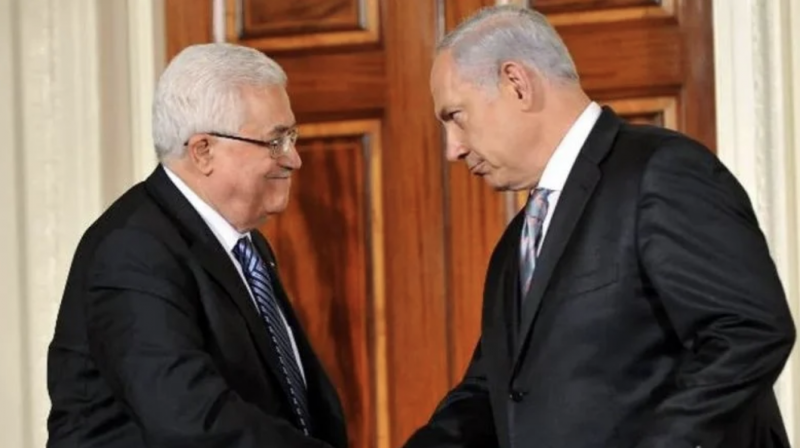
Palestinian Authority President Mahmoud Abbas and Israeli Prime Minister Benjamin Netanyahu at the White House, in 2010. (Credit: AFP)
Head of Israel's National Security Council Tzachi Hanegbi stated in a column of the Arabic-language online newspaper Elaph what the state planned for the aftermath of the Israel-Hamas war: “A moderate Palestinian government that enjoys broad popular support and legitimacy.” He said it was not in Israel's interest to control civil affairs in the Palestinian enclave. “It's not up to us to decide who that player will be,” he stated, stressing the inclusion of President Mahmoud Abbas's Palestinian Authority (PA) in the process, in line with the “will of the international community.” The latter will have to submit to a “fundamental reform” that will focus “on recognition of its duty to raise the young generation in Gaza, Ramallah, Jenin and Jericho on the values of moderation and tolerance, without incitement to violence against Israel.”
More than two months into the war that left over 20,000 Palestinians dead in Gaza, Israel has so far refrained from advancing its plans for the post-war period. The state confined itself to evoking several scenarios to guarantee its short- and medium-term security interests in the Strip. Under pressure from its American ally and Arab countries, it took a step forward. An official team tasked with defining the conditions for future governance in Gaza in the aftermath of the war finally seems to have been set up, including Tzachi Hanegbi and Israeli Minister of Strategic Affairs Ron Dermer.
These statements contradict Israeli Prime Minister Benjamin Netanyahu's previously express rejection of any Palestinian Authority involvement, which governs the West Bank, in post-war Gaza. On Nov. 11, the head of government had even declared that “there will be no civil authority [in Gaza] which educates its children to hate Israel, which pays the killers according to the number of people they have murdered, an authority whose leaders have still not condemned the massacre. There has to be something else,” he said. After casting doubt on a potential Israeli occupation of the enclave, Netanyahu finally rejected this scenario.
American plan
National Security Advisor [to VP Kamala Harris] Phil Gordon’s visit, shortly before the previous statements, was no coincidence. After hardening its tone toward its historic ally, urging Israel to reduce air strikes in order to limit the number of civilian casualties, Washington is increasingly pushing Israeli and Palestinian leaders to think about the next steps. At the end of November, US President Joe Biden explicitly called for the revival of a two-state solution, declaring that “in our quest for peace, Gaza and the West Bank should be reunited under a single governance structure, led by a revitalized Palestinian Authority, as we all work toward a two-state solution.”
Following the Palestinian factions' refusal to consider a multinational peacekeeping force involving Arab countries [another option on the table for the United States], National Security Advisor Jake Sullivan asked Palestinian leaders last week to help ensure security in the Gaza Strip after the war. According to information revealed by the Wall Street Journal (WSJ), Sullivan had essentially asked Palestinian Authority President Mahmoud Abbas to provide security personnel — 1,000 former Palestinian Authority security forces in Gaza and another 3,000 to 5,000 in the West Bank — who could form the nucleus of a force to patrol the Gaza Strip. While Israel's actual adherence to this scenario remains uncertain at best, secret talks between Palestinian factions bringing together Hamas and Fatah officials. They seem to be outlining a potential alliance for the governance of Gaza, under the aegis of the Palestine Liberation Organization, WSJ reported on Wednesday.
Secret talks
In Qatar’s capital Doha, the leaders of Hamas's political wing secretly made contact with their Palestinian rivals, including personalities announced as potential successors to Mahmoud Abbas. These include Hussein el-Sheikh, Secretary General of the Palestine Liberation Organization's Executive Committee and in charge of negotiations with the Israeli government, and Mohammad Dahlan, former head of security in Gaza before being excluded when Hamas came to power. Both were absent from the talks.
“I'm no friend of Hamas,” he said of the possibility of joint governance. "But do you think anyone will be able to come forward to make peace without Hamas?" reported the Daily American. Husam Badran, a member of the Hamas political bureau based in Doha, declared at the end of the talks that he was in favor of “ending the war” and establishing a “Palestinian state in Gaza, the West Bank and Jerusalem.” This is a condition that does not have to include the demilitarization of the Islamist group, he added.
However, this stance reveals the dissension between the political and military wings of Hamas. Yahya Sinwar, head of Hamas in Gaza, was not invited to the talks and reportedly ordered them to end. But the main stumbling block lies on the Israeli side, determined to “eradicate” Hamas, and for whom the faction's presence in post-war Gaza is not an option. PA-led governance in the Gaza Strip would also come up against the faction's extreme unpopularity in the eyes of Palestinians. According to a poll of 1,231 Palestinians published on Dec. 13 by the Palestinian Center for Policy and Survey Research, support for the Palestinian Authority has weakened further, with almost 60 percent of respondents believing it should be dissolved, while 44 percent of West Bank residents said they supported Hamas in general, compared with just 12 percent in September.
This article was originally published in L'Orient-Le Jour.